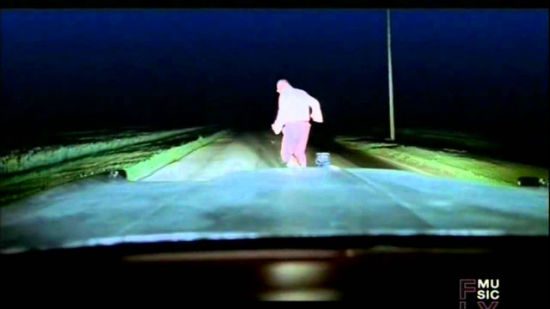Originally posted December 11, 2009.
You can read this entire series, for free, via the convenient Left Behind Index. The ebook collection The Anti-Christ Handbook: Volume 1, is available on Amazon for just $2.99. The sound of wind does not cause cancer. Volume 2 of The Anti-Christ Handbook, completing all the posts on the first Left Behind book, is also now available. Volume 3 is coming soon(ish).
Tribulation Force, pp. 117-126
“Before I get into that,” Carpathia said, stalling, a maddening trait of his that never failed to annoy Buck, “let me just reflect on something. Do you remember when I assured you that I could make a problem go away for you?”
So instead of this conversation going anywhere for the next four pages, Nicolae instead is going to offer Book 2’s fourth or fifth review of this one set of events from Book 1. That sort of stalling really is maddening and unfailingly annoying.
In that episode, Buck’s life was in danger from Todd-Cothran and Stonagal, and in this “stalling” revisiting of that business (Dirk, Flying Tompkins Gazelle of the Yard, “George Oreskovich,” etc.) he thinks repeatedly of how “chilling” and ominous he found Nicolae’s assurance that he would handle them and assure Buck’s safety.
What Buck doesn’t recall and Jerry Jenkins neglects to mention in this four-page summary is that Buck went to Nicolae to beg for his help. This was, in fact, the very first thing he did when he realized he was in danger. And back in Book 1, he wasn’t so much “chilled” by Nicolae’s promise as he was relieved. He was so relieved that he did not hesitate to agree to bury his story — actually, Dirk and Alan’s story — helping to cover up all of the dirt on Stoney and T-C that his friends had died to uncover.
Buck might not have realized at that point that Nicolae was the Antichrist, but he did know that he was a ruthless man who had risen to the presidency of his nation through murder, intimidation and extortion, and that he was at least complicit in the very recent death of Buck’s rival reporter Eric Miller. And knowing all of that about Nicolae, Buck chose to ask this Romanian godfather to handle his problem rather than going to the police or relying on the power of the press to expose those who threatened his life.
Yet now Buck and Jenkins want us to remember all of that as an incident in which Buck acted admirably and was wholly innocent of the lethal violence his friend carried out in response to his request.
Nicolae, meanwhile, is trying to remind Buck that he owes him a favor, but he has to do so in a way that doesn’t undermine his brainwashing-coverup story about the supposed single-bullet suicide-murder:
“You were in dire danger. People around you were dying. I told you I would take care of that, and yet obviously I could have nothing personally to do with it. I confess that when I so boldly assured you that I could make your problems go away, I was not sure how I would effect that. Not being a religious person, I have to say that in this case, good karma was with me. Would you not agree? …
“… you and I both had a problem. You were on someone’s hit list, and I had two people in my trust who were involved in serious crimes. By committing suicide and killing Todd-Cothran in the process, my old friend Jonathan Stonagal took care of the problems we both had. That is good karma, if I understand my Eastern friends.”
I’m fairly sure here that Nicolae/Jenkins do not understand their Eastern friends on the meaning of karma. And note the contrast here between “being a religious person” and believing in karma. Hindus and Buddhists, in the world of Left Behind, don’t seem to count as “religious persons.”
The population of the post-Rapture world consists, in LaHaye and Jenkins’ scheme, of three and only three categories: 1) Tribulation saints who belatedly convert to Real, True Christianity, 2) Jews, and 3) the damned. Category No. 2 is only temporary, as all of the Jews will soon be forced to choose which of the other two categories they will ultimately belong in. And Category No. 3 allows for no distinctions — atheists and animists, Muslims and Mormons, druids and druze are all lumped together and L&J have no interest in any of the ways such people might claim to be different from one another. A devout Hindu who believes in karma is, to them, not “a religious person” because the only religion that counts is the real, true one.
Throughout these pages, Buck maintains his adolescent sulk and his aura of hostile, disdainful silence. And even though, at one point, we’re told that “Carpathia’s eyes bored into him as he seemed to examine Buck’s mind,” the Antichrist still seems incapable of picking up on body language and attitude:
“I have sought no office since I ran for the Romanian senate, and yet this has been thrust upon me. I can do nothing less than give it my all and hope I act in a manner worthy of the trust that has been placed in me.”
A month earlier, Buck would have cursed the man to his face. He wondered if his sentiment showed. Apparently it did not.
“Buck,” Carpathia continued, “I need you.”
Meanwhile, Chloe Steele telephones her dad to work out the driving arrangements for Bible study that night — drive together or take separate cars and meet there? This is something real families really do. It’s part of life. But, like showering or relieving oneself, it’s part of life that usually isn’t included or recounted in a novel.
It’s included here because Jenkins feels the need to switch between protagonists on a regular basis, even when nothing much is going on with one of them. He thus spends a great deal of ink in these books checking in with a character to let us know that they’re still doing what they were doing the last time we checked in with them. Rayford: Still puzzling over the note from Hattie about Air Force One. Chloe: Still angry and hurt over Buck and spiky Alice. Other than that, nothing new to report.
They settle on separate cars and we cut back to Buck and Nicolae.
We left off with Nicolae saying, “Buck, I need you.” And we resume with this:
Buck felt bold. Curious, but bold.
Do with that what you will.
Nicolae tries to persuade Buck that he really has no choice but to accept his offer of employment:
“I know the origin of your nickname, and it is part of what I admire so much about you. But you cannot keep bucking me. It is not that I consider myself anything special, but the world and the news media do. People ignore me at their peril.”
“So I should be afraid of you, and that’s why I should look favorably on whatever role you’re about to offer me?”
“Oh, no! Afraid of ignoring me, yes, but only for the obvious, practical reasons I just outlined. But that fear should motivate you only to come when I ask and provide your way. It should never be the basis on which you decide to work with me. …”
When we first met Nicolae in the previous book, we were told that he spoke flawless English and that he never, ever used contractions
I would argue that those two things are incompatible and that never, ever using contractions is part of the reason that Nicolae’s English is unnatural, stilted and far from flawless. Part of speaking fluently is appreciating context and audience. In Spanish class in school, we were taught about the distinction between the formal usted and the informal tu, and when each form of “you” was the appropriate one to use. A student who decided never to use the informal, always saying usted to everyone in every context, would not be speaking “flawless” Spanish. Likewise with Nicolae’s overly formal English.
I’m guessing that some Gradgrindish grammarian forced a young Jerry Jenkins to follow such unnatural rules in writing the sort of stilted, formal, five-sentence paragraph essays that bad writers always inflict on the young when they’re trying to train up the next generation of bad writers. And I’m sorry that happened to him.
I hope that teacher lived long enough to read these books. That would be my idea of karma.

We should note though that for all of the inconsistencies, contradictions and glaring continuity errors in these books, Jenkins has steadfastly maintained his Nicolae-never-uses-contractions rule. That required a measure of care and attention on his part. Since this is the only instance of such authorial care and attention I have yet found in these books, that’s worth noting and commending — even if the effect of this device isn’t actually what Jenkins intended it to be.
“… fear should motivate you only to come when I ask and provide your way. It should never be the basis on which you decide to work with me. It will not take fear to persuade you on that score.” Buck wanted to ask what it would take, but it was clear that was what Nicolae wanted him to ask, so he again said nothing.
We cut back to Rayford, who is still driving home from the airport and still talking on the phone while doing so. This time he’s talking to his boss, who needs to meet with him, so he’ll need to turn around and drive back to the airport.
Hardly seemed worth cutting back to Rayford just for that.*
“There are laws and there are rules,” Carpathia was saying. “Laws I obey. Rules I do not mind ignoring if I can justify it.”
The example he offers of this distinction is the rule against bringing your own food into a sporting arena. “I would not consider it a criminal act to smuggle in my own snack,” Nicolae says.
You just remember that the next time you’re tempted to bring your own peanuts or Cracker Jacks to the old ball game. That’s just what the Antichrist would do.
Nicolae explains the particular not-a-law-just-a-rule that he has in mind:
“There is a rule that pertains to heads of state and official bodies, like the United Nations. It is understood that only in a repressive dictatorship would the ruler have any ownership or financial interest in a major news media outlet.”
I would say, actually, that only in a repressive dictatorship would the head of state think of himself as “the ruler.” I’d also point out that in 1995, when L&J started writing these books, Silvio Berlusconi was serving his first stint as Italy’s prime minister.
“I am going to purchase major media, and I want you to be part of it.”
“Part of what?”
“Part of the management team. I will become sole owner of the great newspapers of the world, the television networks, the wire services. You may run for me any one of those you wish.”
This gets worse. Much worse, and in so many different directions at once that we’re going to have to pick up from here next week.
For now, though, just consider this: Assume everything the authors have asserted about Nicolae is true — that he’s smart, savvy, a shrewd diplomat, a cunning politician and an astute judge of others. What does it tell us that such a person assumes that Buck Williams would have no qualms accepting a job for state-puppet media?
From everything we read here, Nicolae is correct in this assumption. Buck recoils at his invitation, but only because it’s being extended by Nicolae, whom he knows to be the Antichrist. His distaste is based entirely on the character of the person making the offer, not on any principle of journalistic independence. If the offer came from an RTC Pravda, rather than from the Antichrist’s mouthpiece, Buck would jump at the chance.
– – – – – – – – – – – –
* I’m imagining a table reading for the stage production of Tribulation Force:
“About this scene-change on page 125 …” the stage manager says.
“I’m not paying for that,” the producer chimes in.
“It’s a momentum-killer,” adds the actor playing Nicolae. “Drains all of the dramatic tension we’re trying to build …”
“So does this mean that for their whole scene I’m just sitting out there on the thrust in the dark?” asks the actor playing Rayford.
Trying to write for the theater would be a good exercise that could help to cure Jenkins of his bad habit of pointless POV switches. (But then I love the theater and thus don’t really want Jerry Jenkins involved with it, so never mind and please forget I mentioned it.)
















